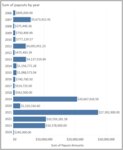
Jill Boogren
By Jill Boogren
In November 2023, Alpha News released a program by former local news anchor Liz Collin called “The Fall of Minneapolis.” In the hour and 42-minute documentary, interviews with (mostly) former Minneapolis police officers are interspersed with footage from body-worn cameras, the trial of Derek Chauvin, protests and the civil unrest. Overall, Collin attempts to rewrite history by painting George Floyd as responsible for his own death on May 25, 2020, police officers as victims during the subsequent uprising, and the conviction of Chauvin in Floyd’s murder as unjust. Ultimately the documentary is as telling for what it doesn’t say as what it does.
The tone is set within the first minute and a half, with a closeup of Floyd’s arrest record dating back to 1997 in Texas. It’s irrelevant to his 2020 encounter with Chauvin, but its inclusion here does serve to impugn Floyd’s character. The documentary then plays and replays footage of Floyd saying “I can’t breathe” during a previous arrest, as well as before he was held to the ground by Chauvin. During each incident, he is visibly distraught, seemingly panic-stricken. For the purposes of the documentary, it doesn’t seem to matter that in the first incident Floyd is not held face to the pavement for nine minutes or that in the second, when he is actually killed, he is.
The documentary selectively highlights words and passages of official documents to underscore points, while often leaving off key information. A couple of examples relate to Floyd’s autopsy. Here Collin revisits the argument that Floyd’s cause of death was drugs and a preexisting health condition and not his interaction with Chauvin (all of which was examined and cross-examined during the trial). One sequence shows a memo of a conversation that took place between Hennepin County Medical Examiner Dr. Andrew M. Baker and the Hennepin County Attorney’s Office. The camera zooms in on Baker’s statement that drug levels found in Floyd’s system could be called an overdose if he were found dead at home alone with no other apparent causes. It highlights all text except “and no other apparent causes.” It also pans past Baker’s follow-up statement which reads, “I’m not saying this killed him.”
In another memo, in which Baker opines that the cause of death may be multifactorial, the words “coronary artery disease,” “stimulants” and “exertion” are highlighted. Not highlighted is the rest of the third item, which reads in full, “The exertion caused by Mr. Floyd’s encounter with the police officers.” It goes on to say (again, not highlighted in the video), “In [Baker’s] experience, overexertion of the heart is one of the reason [sic] police departments avoid using the type of hold at issue.”
Glossing past this detail is significant, given the assertion by officers in the documentary that the Maximal Restraint Technique hold used by Chauvin is part of Minneapolis Police Department (MPD) training. These remarks are juxtaposed with then-Police Chief Medaria Arradondo testifying at the trial, “It is not.” Chauvin’s mom, Carolyn Pawlenty, who was also interviewed for the documentary, pulls out an officer training manual that shows an illustration of the restraint. The insinuation here is that Arradondo is lying, and Pawlenty says so. But what the documentary leaves off is the testimony by both Arradondo and Lt. Johnny Mercil, who teaches use of force at MPD. Each say that even if the method is initially used to gain control, the officer should stop and move the person into a recovery position as soon as there are no signs of resistance – which was indisputably the case when Floyd was no longer responsive and lay motionless for the last three minutes Chauvin held his knee to Floyd’s neck.
This, too, is examined and cross-examined during the trial. In his testimony, Baker reiterates his stance that Floyd’s death was from a cardiopulmonary arrest caused by law enforcement’s “subdual, restraint and neck compression.”
Collin seems to dismiss the use of video taken by bystander Darnella Frazier (and a still image from it, Exhibit 17) in favor of the highly-obstructed view from former officer J. Alexander Kueng’s body-worn camera, even though Frazier’s footage offers a clearer view of Chauvin and Floyd. The documentary suggests that body cam footage was withheld in the trial. Minnesota Reformer’s Deena Winter, who was among reporters in the press pool viewing the trial (I was not), writes in "I watched ‘The Fall of Minneapolis’ so you don’t have to” that she was asked by a national news outlet to count the number of times video of Floyd’s death was shown at the trial – she counted 166 clips. It’s noteworthy that the documentary never once shows the full nine minutes immediately preceding Floyd’s death.
At another point, Collin shows a clip of Mayor Jacob Frey asserting that “crime is down” and cuts to data showing the opposite – a spike in the number of carjackings, gunshot wound victims and homicides in 2020 and 2021. The implication is that the mayor is lying, though a closer look at the data on screen shows a drop in 2022 in all three categories to levels lower than those reported in 2020 (except carjackings, which weren’t tracked separately until September 2020). According to the MPD Crime Dashboard, these trends continued further downward through 2023 (see table above).
Officer misconduct
Other information is noticeably omitted as well. Collin does not disclose her marriage to former Minneapolis Police Federation union head Bob Kroll. Kroll willfully defied Minneapolis policy in 2020 by openly encouraging officers to participate in “warrior-style” training – a practice that was banned for both on- and off-duty officers.
Collin uses her access by interviewing officers who had not yet talked to the media, including Chauvin who spoke to her by phone from prison in Arizona and who called the trial and sentencing a “sham.” If Collin considers Floyd’s prior arrest record is relevant, then so is the history of officers who were interviewed – most of whom had a number of complaints filed against them. As tracked on the Communities United Against Police Brutality website: Lindsay Herron had 10 complaints; Scott Creighton, 16; Jason Reimer, 28; Al Williams, 32; Derek Chauvin, 32. With the exception of Chauvin who was fired and is incarcerated, these officers have all retired.
Sgt. Rich Walker, who chose to remain on the force, has had nine complaints. According to the Police Discipline Decision Dashboard, Walker was suspended in 2023 for failing to report derogatory remarks made by two officers during a 2021 arrest (who were also suspended). Other records show that in 2015, a trial jury awarded a plaintiff $66,000 in a settlement against Walker for use of excessive force during a 2013 arrest.
In fact, the City of Minneapolis has a long history of paying out cash settlements for claims of misconduct and use of excessive force by the MPD – more than $50 million from 2020 through February 2024, when the City’s Officer Payouts Dashboard was last updated. These include the $27 million awarded to Floyd’s family in 2021, as well as $7.5 million awarded in 2023 to John Pope for alleged use of excessive force by Derek Chauvin; Pope was 14 years old at the time.
Kroll, who was not interviewed for the documentary, also had a long list of complaints lodged against him – 52 during his 32 years on the force. He retired in January 2021. A lawsuit brought against Kroll for his role in the police violence against protesters in 2020 was settled in April 2023 on the condition that Kroll not serve as a police officer nor in a leadership role for any law enforcement agency anywhere in Hennepin, Anoka or Ramsey counties for 10 years.
Another $950,000 was just awarded in February 2024 to journalists who were injured or wrongfully detained by police during the 2020 protests.
Overall, the documentary is designed to elicit sympathy for Minneapolis police officers, many of whom have since left the job. In their interviews, some express feelings of abandonment by the city when they were instructed to leave the Third Precinct during the protests.
“Cops do not run away. You run to,” says an emotional former Lieutenant Lindsay Herron in recalling how it felt to evacuate the Third Precinct upon order from the higher ups. She speaks to the feeling of being trapped inside the fencing behind the precinct building with no clear exit. They had inadvertently kettled themselves in. (This practice is frequently used by law enforcement against protesters – such as that which trapped 646 people for more than five hours on I-94 in November 2020. It is terrifying; no wonder many officers left their positions claiming post-traumatic stress disorder.).
And then there are the blatant omissions. In April 2022, well before the release of this documentary, the Minnesota Department of Human Rights (MnDHR) issued its findings that the City of Minneapolis and MPD engage in a pattern or practice of race discrimination in violation of the Minnesota Human Rights Act. In March 2023, the MnDHR reached a court enforceable agreement, a consent decree, with the city of Minneapolis to implement specific changes. In June 2023, the U.S. Department of Justice issued its findings of civil rights violations by the city and MPD, which will also result in a consent decree; the two-page table of contents in the DOJ report is by itself a scathing indictment of the culture of the MPD.
Neither of these investigations is mentioned in the documentary.
In attempting to make the case that Chauvin was doing the job as he was trained to, “The Fall of Minneapolis” – by its own omissions – ends up hitting on precisely the point advocates have been making for many years that is now corroborated by state and federal agencies: that the MPD as an institution must be overhauled.


Richmondfc
Jill Boogren does a public service with this piece in pointing out the sleek deceptiveness of Liz Collins’ rough assembly of propaganda video that denies full accounting of the facts when it comes to the Chauvin case. This is much needed balance to the hate-filled commentary being whipped up on YouTube in support of the errant-filled video.
Monday, June 24 Report this